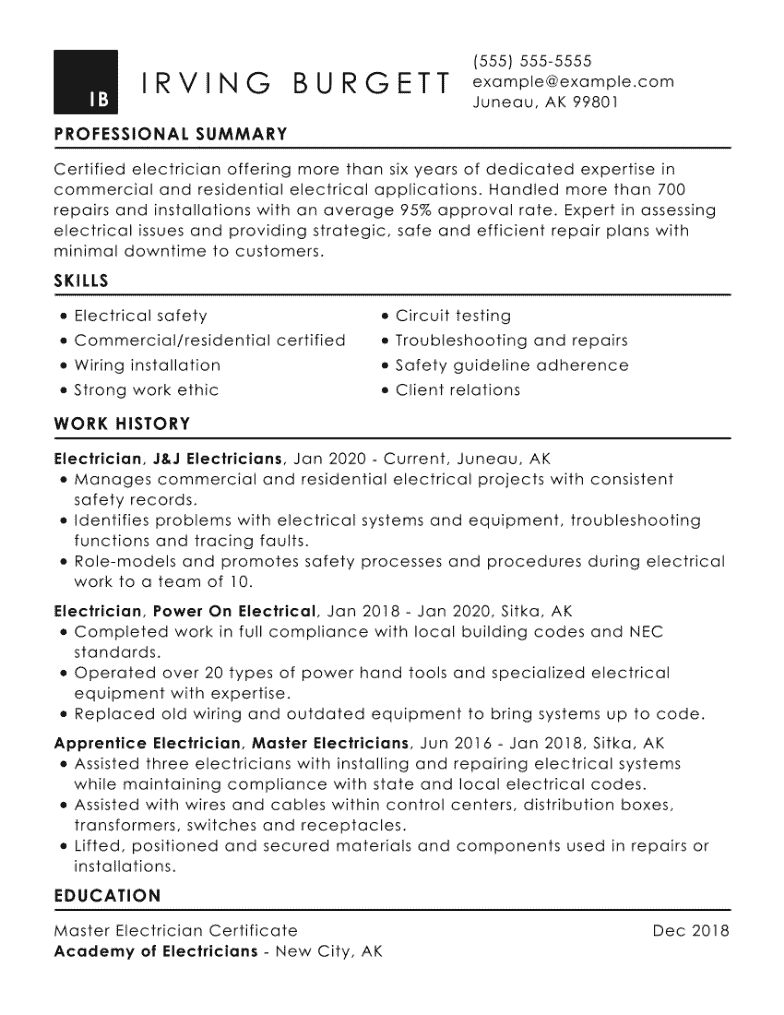Stunning electrician CV examples for you to use
Becoming an electrician is all about skill, but you need a great CV to get the right electrician job. How can you create a CV that will turn heads?
Becoming an electrician is all about skill, but you need a great CV to get the right electrician job. How can you create a CV that will turn heads?





OUR USERS HAVE BEEN HIRED BY

Electricians largely rely on experience and technical skills, which should be showcased on your CV. However, it’s very common that you’ll need to use soft skills as well (e.g., interacting with clients), so it’s also important to include them on your CV. You also need to make sure you have the necessary certifications for your area and showcase those as well.
Electricians largely rely on experience and technical skills. However, it’s very common that you’ll need to use soft skills as well (e.g., interacting with clients), so it’s also important to include them on your CV. You also need to make sure you have the necessary certifications for your area, and showcase those as well.
An electrician CV will typically have all the same elements as any other CV. If you want to make sure your CV really shines, make sure you get some CV writing help with the CVHelp CV builder, which will help you do everything from creating a skills section to wording bullet points and making sure your CV looks attractive to all kinds of recruiters.
Here are the sections you should include in your electrician CV:
A header gives your name, contact information and other information you want the hiring manager to see right away. It’s extremely short, typically only a few lines long, and may include a CV headline, which is a one-phrase summary of who you are.
Next is your professional summary or career objective. Think of this as a slightly expanded CV headline. It tells the hiring manager, in just a few sentences, what your absolute best qualities are. It may give insight into how many years of experience you have, whether you’ve earned any recognition for electrical work, and any major projects of which you’ve been a part.
When writing out your professional experience, you should start with your job title. Your job title may look like one of these:
Under each job title, you’ll typically want to include up to five bullet points showcasing what you were responsible for in that job. Here are a few suggestions to get you started:
Your work history should show that you have the necessary experiences to excel at the job you’re applying for, so highlight experiences and accomplishments that tie in with the potential job.
The education section for electricians may be extensive or less so, depending on the exact position. If you only have a high school diploma, you can list it here. If you have more than that — for example, a college degree or a trade school licence you received after going through a training school — list those achievements instead of your high school diploma.
The skills section of any CV has the potential to be jam-packed, but for electricians, you should feature both soft skills (intangible traits such as conflict resolution and a strong work ethic) and hard skills, which are also called technical skills. Present yourself as a candidate who has both people skills and the ability to fix electrical problems.
The best CV for an electrical expert should include specific skills that relate to the job. Use these CV examples to determine what wording and information works for each section, check the job description to pinpoint skills and experiences the job is looking for, and update your CV accordingly.
Cover letters are important for any job search, and this is true for electricians as well. Although it can seem like an unnecessary step, including a cover letter can put you ahead of others who just submit CVs. Make sure you check the cover letter examples at CVHelp to see what types of wording and experience you should include in the cover letter.
If you don’t have a lot of experience already in the field, you should include whatever experience you do have. This includes experience as an apprentice and while you were studying. Additionally, rely heavily on skills. Hiring managers want to know that you understand electrical systems and can effectively fix them. If you can get references that are well established in the electrician field, this can also help you get the job.
The best way to do this is to read the job application for each job and pick out keywords that emphasise the job’s requirements. This can include specific skills and experiences. Match those keywords with your own skills and experiences, and update your CV to meet those needs.
We personalize your experience.
We use cookies in our website to ensure we give you the best experience, get to know our users and deliver better marketing. For this purpose, we may share the information collected with third parties. By clicking “Allow cookies” you give us your consent to use all cookies. If you prefer to manage your cookies click on the “Manage cookies” link below.